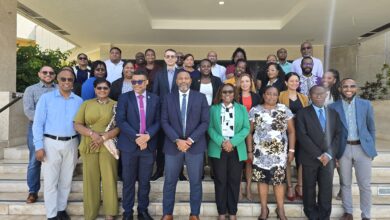The Fourth Inter-Sessional Meeting of the Conference of Heads of Government of the Caribbean Community was held at the Fort Young Hotel, Roseau, Commonwealth of Dominica, on 22-23 March 1993.
The Heads of Government in attendance at the Meeting were:
Hon. Hubert Ingraham, Prime Minister, Commonwealth of The Bahamas; Rt. Hon. Erskine Sandiford, Prime Minister and Minister of Finance and Economic Affairs, Barbados; Rt. Hon. George Price, Prime Minister, Belize; Hon. Dame Mary Eugenia Charles, Prime Minister, Commonwealth of Dominica; Rt. Hon. Nicholas Braithwaite, Prime Minister, Grenada; His Excellency Dr. Cheddie Jagan, President, Guyana; Hon. Reuben Meade, Chief Minister, Montserrat; Rt. Hon. Dr. Kennedy Simmonds, Prime Minister, St. Kitts and Nevis; Rt. Hon. John Compton, Prime Minister, Saint Lucia; Rt. Hon. James F. Mitchell, Prime Minister, St. Vincent and the Grenadines.
The Delegations of Antigua and Barbuda, Jamaica and Trinidad and Tobago were respectively led by Hon. Lester Bird, Minister of External Affairs, Planning and Trade, Sen. The Hon. David Coore, Minister of Foreign Affairs and Foreign Trade and Hon. Ralph Maraj, Minister of Foreign Affairs.
International Environment
The Meeting took note of the major developments on the international scene. Of particular significance to the Heads of Government was the fact that since their Meeting in July 1992, Canada, Mexico and the United States had signed the North American Free Trade Agreement, (NAFTA) and the European Single Market had been established. They noted with concern the thrust on the part of industrialised countries towards the creation of large trading blocs and that the insistence of some of these countries on accelerated trade liberalisation in respect of all developing countries has presented a number of developing countries, including those of CARICOM, with major economic challenges.
The Heads of Government were also concerned that while the international community has reduced its focus on the debt problem the debt burden remains a major constraint especially for small countries.
Bananas
The Heads of Government reaffirmed the vital importance of the banana industry to a number of Member States, particularly the Winward Islands which are almost totally dependent on those countries. In this context, the Heads of Government discussed the European Community’s decision regarding the common arrangements for the marketing of bananas in the European Community and the subsequent reaction of certain countries. They welcomed the decision by the Community, recognising that while it did not fully satisfy the guarantees enshrined in the Lomé Convention, it was the compromise which will most effectively balance the legitimate interests of all the concerned parties. They urged all concerned parties to accept the decision and agreed to fully support the European Community in its defence of the arrangements. In this context, they reaffirmed the sentiments expressed in their resolution of 24 February 1993, and expressed their determination to take all necessary action to protect the interest of the Region in this vital industry.
The Creation of the CARICOM Single Market and Economy
The Heads of Government noted that the revised Common External Tariff and the Rules of Origin would be introduced by 30 June 1993 and that all remaining barriers to intra-regional trade should also be removed by this date thus contributing significantly to creating a Single Market. They agreed that efforts to integrate the regional market for goods were proceeding according to schedule. However, they agreed that urgent action was needed in respect to the integration of services and that the introduction of the arrangements for the free movement of labour and capital would have to be accelerated in order to achieve the objective of the establishment of the CARICOM Single Market and Economy. To this end, they agreed to co-operate fully in facilitating this process.
Steps Towards a Common Currency The Heads of Government welcomed the establishment of the Council of Governors of the Central Banks of the Caribbean Community in keeping with the decision taken at the Thirteenth Meeting of the Conference to adopt a staged approach to the creation of a Monetary Union.
Enlarging Investment The Heads of Government noted with satisfaction that the negotiations towards the establishment of a Caribbean Investment Fund was at an advanced stage and agreed that Member States would take all the necessary measures to facilitate the completion of the process of establishing the Fund at the earliest possible date.
Debt – Problems Facing the Region The Conference expressed concern that in spite of recent initiatives, the external debt continues to be a heavy and a major constraint to growth in the economies of most of their Member States. The Conference called on the international community for greater understanding of the debt problem and for the adoption of appropriate measures. The Conference also called upon the industrialised countries to encourage the International Financial Institutions to devise and implement measures for reducing the constraining effects of the debt burden.
Japan
The Heads of Government welcomed an initiative from the Government of Japan for the holding in Jamaica later this year of a meeting between Japan and the countries of the English speaking Caribbean to discuss possibilities for closer collaboration. The Conference agreed that every effort would be made by Member States to participate in the Meeting.
South Africa
Following a report from the Secretary-General of the Commonwealth on current developments in South Africa the Heads of Government expressed their special satisfaction with the prospects for the multi-party talks and in particular the agreement by parties such as PAC and AZAPO, (which had not previously been involved in the process) to participate in the negotiations.
The Heads of Government took note of the success of the Commonwealth Observer Group in South Africa and of the participation of CARICOM in the exercise through Senator Fred Mitchell of The Bahamas.
The Heads of Government also recognised the importance of the presence of three other Observer Groups from the UN, the EEC and the OAU, all concerned with the reduction of the level of violence in South Africa.
The Heads of Government agreed that in consultation with the Commonwealth, CARICOM Governments would be prepared to remove trade and investment sanctions against South Africa as soon as agreement is reached by the Multi-party Group, on the installation of the transitional arrangements towards the establishment of a non-racial democracy.
The Heads of Government also agreed that the removal of financial sanctions could be considered once the Constituent Assembly was in place and the Multi-party Group called for the removal of all sanctions.
Hemispheric Relations
Relations with the United States of America
The Conference endorsed the action taken by the Bureau to sensitise the new US Administration to the priority concerns of the Region. They agreed to request the CARICOM Group of Ambassadors to maintain the closest possible contact with the relevant United States Officials in order to promote and defend the interests of the Region.
The Heads of Government reiterated their concern about the possible negative effect which the NAFTA arrangement will have on trade and investment in the CARICOM Region. In this regard, they called upon the signatory countries to that Agreement to extend to CARICOM products not included in the Caribbean Basin Initiative (CBI) and CARIBCAN the same treatment accorded to these products originating from Mexico.
The Conference noted the initiative within certain sectors of the United States Congress towards the introduction of the Caribbean Basin Free Trade Agreement Act of 1993 aimed at protecting Caribbean Basin countries from the effects of NAFTA. They expressed their desire to review more thoroughly the provisions of the Bill especially those which seem to drastically limit the life of the proposed legislation. The Conference also agreed to present the US authorities with a documented submission on the adverse effects of NAFTA on CARICOM-US Trade and Investment Relations.
936 Funds
The Heads of Government expressed their support for the retention of the Puerto Rican 936 loan facility which provides a vital source of investment funds for CARICOM States.
Relations with Canada
The Heads of Government also expressed their appreciation to the outgoing Prime Minister of Canada for the support and solidarity demonstrated to the Community during his tenure in office as Prime Minister. They expressed the hope that his successor would demonstrate a similar commitment to the maintenance of the traditional ‘special’ CARICOM-Canada relationship.
Latin America
The Heads of Government noted with satisfaction that the one-way free trade agreement with Venezuela was now in force. It was also noted that the Fourth Meeting of the CARICOM/Venezuela Joint Council on Trade and Investment is to be convened shortly.
In keeping with their commitment to deepen the integration process, the Heads of Government agreed to explore opportunities for the establishment of closer relations with the countries of Latin America. In this context, they accepted a proposal from the Government of Columbia to initiate negotiations towards the conclusions of a Free Trade Agreement between CARICOM and the Republic of Columbia which took account of the difference in the economic development of the respective countries.
Association of Caribbean States
The Conference considered steps towards the establishment of an Association of Caribbean States (ACS), and, given the complexity of the issues involved, agreed that the matter needed further study at the national level before allowing for its consideration at the next meeting of the Standing Committee of Ministers of Foreign Affairs (SCMFA), scheduled for May 1993.
The Conference also agreed that the results of the deliberations of the SCMFA on this matter should be considered by the Bureau, which would be mandated to make recommendations to the Conference of Heads of Government in July 1993.
Central America
The Conference welcomed the further concrete developments in CARICOM-Central America relations and looked forward to the convening of the Second CARICOM-Central America Ministerial Meeting in late May 1993.
Cuba
The Conference took note of the fact that, pursuant to the decision taken at its Thirteenth Meeting, attempts were being made to initiate at an early date concrete steps towards the establishment of a CARICOM/Cuba Joint Commission to advance co-operation between the Parties.
Haiti
The Heads of Government reaffirmed their condemnation of the continued suppression of the democratic process in Haiti. They reiterated their serious concern with the persistence of human rights abuses, political repression and the blatant disregard, by the Haitian regime, for the lives of Haitian citizens.
The Heads of Government noted the continuing efforts of the joint UN/OAS Civilian Mission, towards the resolution of the Haitian political crisis. They agreed that the Caribbean Community would continue its financial and manpower support of the Un/OAS International Civilian Mission to Haiti.
The Heads of Government noted with profound regret the failure of the international community to observe the trade embargo imposed against the regime in Haiti.
With a view to accelerating a solution to this problem, the Heads of Government called for the adoption of all necessary measures including the imposition of a blockade if required, and for the urgent consideration of the situation by the UN Security Council.
Belize-Guatemala Relations
The Conference welcomed the positive developments in the relationship between the Governments of Belize and Guatemala. Heads of Government noted the decision of the Constitutional Court of Guatemala on 12 November 1992, to uphold the action of President Serrano in recognising Belize as a sovereign State and establishing diplomatic relations. It was further noted that the Government of Guatemala was represented at the Ministerial Level at the Meeting in Belize on 19-21 February 1993, to analyse and co-ordinate anti-drug activities in the Region.
The Guatemalan claim to Belize remains unsolved despite these improved relations. They noted that Belize has a bi-partisan commission ready to pursue negotiations.
The Conference of Heads of Government expressed continued support for Belize in its endeavour to achieve a solution to the territorial claim. The Prime Minister of Belize thanked CARICOM for its continuing support and requested this support until the claim is removed.
Guyana-Venezuela Relations
The Conference noted with appreciation that the United Nations Secretary-General has agreed to the continued appointment of Sir Alister Mc Intyre as his representative in the Good Offices procedure in connection with the Guyana-Venezuela territorial controversy.
The Conference also noted the initiative taken by President Jagan early in his tenure of office to visit Venezuela in March 1993, to demonstrate his Government’s commitment to continued cordial and productive relations between Guyana and Venezuela.
The Tourism Sector
The Heads of Government received a report on progress made since their 1992 Tourism Summit and expressed appreciation that the North American advertising campaign has been launched. They pledged their continued support for the Regional Marketing Programme in 1994.
The Heads of Government welcomed the implementation of the Regional Tourism Organisation funded under Lomé III as agreed on by the Caribbean Tourism Organisation and the European Community. The Heads of Government also reiterated the need to market the Caribbean as a Region having a diversified tourism product.
With regard to the Cruise Lines, the Heads of Government focussed specifically on the issue of a unified per capita tax. On this matter the Heads of Government committed themselves to taking a final decision in the very near future.
The Heads of Government agreed that guaranteed air transportation was critical to the success of the Regional Tourism Industry. They noted with concern the uncertainty facing some of the major international carriers servicing the Region. In this regard, the Heads of Government were of the view that the question of viability of the existing regional carriers must be accorded priority attention.
They agreed to address the entire issue of air transportation at their Fourteenth Meeting.
The Environment
The Heads of Government deliberated on the subject of Environment and Development and gave full support to the United Nations Global Conference on Sustainable Development of Small Island Developing Countries scheduled for 4 – 15 April 1994, in Barbados. The Conference was also supportive of a regional Technical Meeting for the Caribbean and Atlantic as part of the preparatory process for the UN Global Conference.
The Conference also urged Member States to pursue actively the objective of seeking access to the resources available under the UNDP Programme – Capacity 21 – to assist Governments to build the national and regional capacity to formulate and implement programmes of sustainable development.
New Institutional Structures of The Community
The Heads of Government reviewed the proposals for the establishment of new structures for the Caribbean Community. They noted the progress which has been made and agreed to complete the necessary national consultations by the next Meeting of the Conference in July.
The Assembly of Caribbean Community Parliamentarians
The Conference welcomed the signing of the Agreement for the establishment of the Assembly of Caribbean Community Parliamentarians by the Prime Ministers of the Commonwealth of the Bahamas and of Grenada.
Twentieth Anniversary Celebrations Of the Community
The Heads of Government decided to commemorate the Twentieth Anniversary of the Caribbean Community, over the year beginning 4 July 1993 and endorsed a proposal for a series of activities, beginning with a “Regional Focus on Youth” on CARICOM Day.
Restructuring of the CARICOM Secretariat
The Heads of Government received proposals for a Strategic and Restructuring Plan for the CARICOM Secretariat and agreed, after a preliminary review that the proposals should be considered by the Inter-Governmental Committee within the context of the review of the new institutional structures of the Community, to enable the Conference to arrive at a definitive decision on this important issue at its regular Meeting in July.
Caribbean Resources Development Foundation (CARDEV)
The Conference took note of the activities and projects which are being successfully developed by CARDEV through the negotiation of financial and technical assistance and other forms of assistance, in North America, in support of social and economic development in the Region. Heads of Government endorsed the Action Plan of CARDEV and welcomed the initiatives of that Organisation as a useful complement to the Region’s development efforts.
Obituary
The Conference expressed its recognition of the significant contribution made the late Hon. G. Arthur Brown, the former Governor of the Bank of Jamaica, to the Caribbean integration movement. The Conference expressed its profound regret at his recent passing and conveyed its sincerest condolences to the bereaved family and agreed to transmit the following message:
Message
“It is with profound sorrow that the Inter-Sessional Meeting of the Conference of Heads of Government at its Fourth Meeting, held in Roseau, Dominica, took note of the passing of the late Hon. G. Arthur Brown, former Governor of the Bank of Jamaica. The Meeting recorded its recognition of the tremendous contribution of that distinguished economist to the Caribbean integration movement and conveys its sincerest condolence to the bereaved family.”
Acknowledgement
The Heads of Government expressed their thanks to the Government and people of the Commonwealth of Dominica for the welcome and hospitality received during their stay in Dominica.
Date and Venue
The Heads of Government look forward to convening their Fourteenth Meeting in the Commonwealth of The Bahamas on 5 – 8 July 1993.
Roseau, Dominica
23 March 1993
RESOLUTION ON MONTSERRAT’S PARTICIPATION IN THE REGIONAL INDICATIVE PROGRAMME UNDER LOMÉ IV
Having regard to the objectives of the Caribbean Community and in particular the search for “sustained expansion and continuing integration of economic activities, the benefits of which shall be equitably shared taking into account the need to provide special opportunities for the Less Developed Countries”;
Conscious that Montserrat is the smallest of the Member States of the Caribbean Community;
Mindful of the devastating impact of Hurricane Hugo on the infrastructure of Montserrat and the need to rebuild and improve that infrastructure;
Aware of the provisions and philosophy of the Lomé Convention to promote integration and co-operation including co-operation between ACP States and OCTs, the TOMs, and DOMs;
Recalling the fact that Montserrat, as a founding member of the Caribbean integration movement, has traditionally been involved in the various Caribbean Regional Programmes;
Also recalling the commitment by the Caribbean Forum to support the funding of the Blackburn Airport under the Lomé III Regional Programme;
Aware that in the light of the devastation wreaked on Montserrat by Hurricane Hugo, Montserrat was unable to proceed with the project at that time but received the firm commitment of all Caribbean ACP States in the Forum that in reallocating the resources the Blackburn Airport Project would receive highest priority in the allocation of resources under Lomé IV Regional Programme;
Reiterate their strongest support for the Blackburn Airport Project which constitutes an integral part of the infrastructure for regional tourism development;
Strongly urge the European Community and Commission to work with the Caribbean ACP States in according highest priority and support for the speedy implementation of the Blackburn Airport Project in Montserrat
Roseau, Dominica





